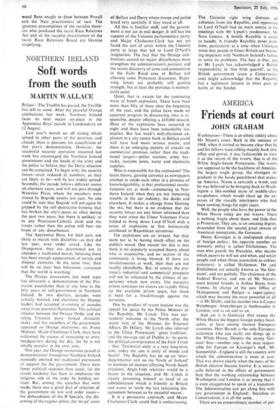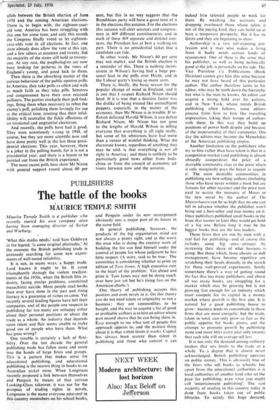AMERICA
Friends at court
JOHN GRAHAM
Washington—There is an ethnic oddity about Mr Nixon's court. Back in the summer of
1968, when it started to become clear that he and his fellows were rolling steadily back into office and power, it was fashionable to view
it as the return of the WASPS, that is of the White Anglo-Saxon Protestants. The WASPS are supposed to be the backbone of America,
the largest single group, the strongest in-
gredient in the heady punchbowl that makes up America. Nixon is certainly a WASP, and
he was believed to be bringing back to Wash- ington a like-minded team of middle-class waspishness which would clean up the ex- cesses of the rascally interlopers who had been running things for eight years.
Well, the people who have the power in the White House today are not WASPS. There
is nothing Anglo about them, and little that is Protestant. They are, to an amazing degree, descended from the second great stream of American immigrants, the GermanS.
Henry Kissinger is in undisputed charge of foreign policy : his opposite number on domestic policy is called Ehrlichman. The man who guards the President, who decides which papers he will see and when, and which people and when (from journalists to cabinet ministers), is called Haldeman. He and Ehrlichman are actually known as 'the Ger- mans', and not politely. The chairman of the Federal Reserve, and one of Mr Nixon's most trusted friends, is Arthur Burns from Vienna. In charge of the new Office of Management and Budget—a super-agency which may become the most powerful of all - Mr Shultz, and his number two is Caspas Weinberger. Annenberger is Ambassador in London, and so on and so on.
And yet it is Germany that causes the White House the biggest foreign policy head- aches, at least among western European countries. Herr Brandt is the only European statesman who can really stir things up in the White House. Despite the strong 'Ger- man' bias—another one is the man respon- sible for Europe on Kissinger's staff, Mr.
Sonnenfeld—England is still the country with which the administration is most at ease. This was shown clearly when the news of the British election became known. It is univer- sally believed in the offices of government here that the working relationship between Washington and London is so strong that it is even exaggerated to speak of a transition. The Administration can get along fine with any government in England: Socialists or Conservatives, it is all the same.
There are an extraordinary number of par- allels between the British election of June 1970 and the coming American elections. There is, to begin with, the eighteen-year- old vote. America has been struggling with this one for some time, and only this month the Congress finally voted to let eighteen- year-olds vote in all elections. In fact, one state already does allow the vote at this age, and a few others at nineteen and twenty, but the majority of the states still hold to twenty- one. At any rate, the psephologists are now busy looking for patterns in the votes of England's young, and good luck to them.
Then there is the absorbing matter of the curious behaviour of the public opinion polls. In America, they take polls as often and with as much faith as they take pills. Senators and congressmen have their own retained pollsters. The parties stockpile their poll find- ings, firing them when necessary to rebut the enemy's poll, polishing them lovingly for use at the critical time, trusting that their infal- libility will neutralise the fickle affections of an irrational and ungrateful electorate.
And recently, the polls have had it good. They were notoriously wrong in 1948, of course, but they are more scientific now and have done pretty well in the last three presi- dential elections. This year, however, there is a joker in the polling booth, for it is not a presidential year, and there is a lesson to be pointed out from the British experience.
The most recent polls here show Mr Nixon with general support round about 60 per cent, but this in no way suggests that the Republican party will have a good time of it in the elections this autumn. For the elections this autumn will elect senators and congress- men in 469 different constituencies, and in each of these 469 separate and distinct con- tests, the President has at best a walking-on part. There is no presidential ticket that a candidate can ride.
In other words, Mr Nixon's 60 per cent may not matter, and the British election is a reminder of this. There is nothing incon- sistent in Wilson's having had a huge per- sonal lead in the polls over Heath. and in the Labour party's losing so many seats.
There is, finally, the basic reason for the popular change of mind in England, and it is one that I suspect Richard Nixon should heed. If it is true that a decisive factor was the dislike of being treated like unintelligent puppets, especially in the matter of the economy, then Mr Nixon is in trouble. If in- flation defeated Harold Wilson, it can defeat Richard Nixon. Mr Nixon has not gone to the lengths of Harold Wilson in telling everyone that everything is all right really, but some of his utterances have had more than a veneer of wishful thinking. What the electorate knows, regardless of anything they may be told, is that everything is not all right in America: and there is unlikely to be particularly good news either from Indo- china or from the council of economic ad- visers between now and the autumn.































 Previous page
Previous page